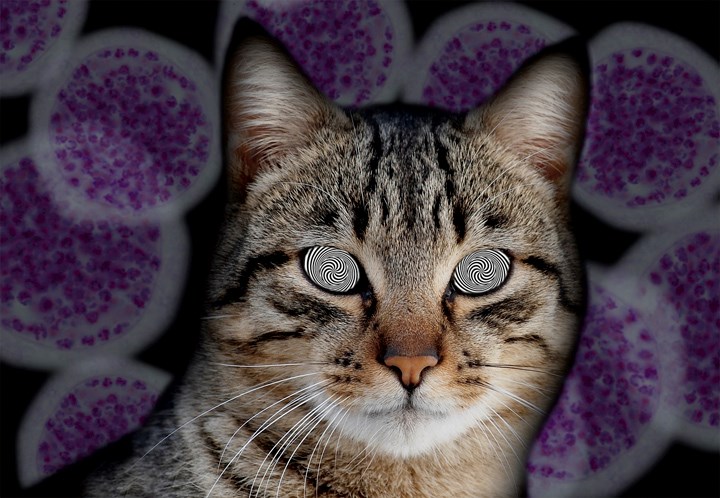A recent article in the journal Cell, by Mauro Costa-Mattioli and colleagues, suggests female mice with a diet rich in fat generate litters with social deficits due to the changes in the offspring's gut bacteria.
According to the paper, high-fat diet offspring spend less time interacting with other mice. The researchers found fewer neurons containing oxytocin, a hormone which has been labeled the "cuddle compound" as it induces social bonding.
Further, electrical signals in the ventral tegmental area of the brain did not increase as expected following new social interactions. The team was able to reverse these abnormalities by giving the bacteria Lactobacillus reuteri to the mice.
Our behavior, to a large extent, is determined by a carefully constructed balance of neurochemicals or neurotransmitters in our brains. This is true of any living creature with neurons and has been demonstrated on much simpler organisms.
Further, the idea parasites might be affecting our behavior is not a new one in science. Certainly in lesser organisms there is plenty of evidence supporting behavioural abnormalities arising from bacterial infections or the presence of parasites.
Most people have heard of "zombie ants" where a particular fungus (Orphiocordyceps unilateralis) takes control of an ant's body, forcing it to climb as high as possible, latch onto the major vein of a leaf, and wait to die during which the fruiting body of the fungus grows out of the ant's head and spreads its spores infecting more ants.
Discovered by Alfrew Russell Wallace in 1859, the fungus has been known to wipe out entire colonies of ants. However, the fungus is also prey to a parasitic organism which limits its spread.
In a recent book, entitled Mother Nature is Trying to Kill You, Dan Riskin - host of Animal Planet's Monsters Inside Me and co-host of Daily Planet - explores some of the parasitic organisms which actually do infect humans and may alter our behavior.
For example, Toxoplasma is a parasite for any number of mammals including rats and humans but it has a particular relationship with cats (felids). It is only in cats that the parasite can complete its life cycle through sexual reproduction. However, it can also spend some of its life cycle in rats.
The cycle typically involves a rat eating some Toxoplasma eggs - or "zygote containing oocysts" - when the rat consumes food contaminated by cat feces. It doesn't take much contact between cat feces and their surroundings to transfer the eggs so the rat does not need to come into direct contact. It only needs to eat something touched by the cat feces.
Once inside the rat's body, the eggs turn into cysts which attach to various parts of the rat's body but predominantly in its brain. When the rat gets eaten, the cysts get into the cat stomach and the organism matures completing its life cycle as its eggs are excreted in the cat's feces.
The tricky part of this life cycle is ensuring the rat gets eaten. After all, cats and rats have a natural aversion to one another. They are mortal enemies.
Indeed, if a rat comes across the smell of cat urine, the odour generates signals in the fear centre of the rat's brain resulting in the rat immediately seeking a hiding spot. Simply put, the smell of cat urine terrifies rats.
How to get around this terror? Some of the cysts formed by Toxoplasma in the rat's brain occur at the fear centres normally triggered by cat urine. These cysts modify the rat's wiring so the signal goes to the sexual pleasure centre. To be blunt, instead of terrifying the rat, the smell of cat urine turns it on.
As a consequence, the rat is much more likely to spend time in the vicinity of cats thereby enhancing the likelihood it will get caught and eaten. Neat trick.
What does this have to do with humans?
Cat owners are likely to ingest some Toxoplasma eggs as well. It is estimated one third of the world's population is infected with this parasite. And while the smell of cat urine is not likely to make you horny, the cysts do rewire the human brain.
For example, reaction time of humans infected by Toxoplasma is a little bit slower which could explain why cat owners are statistically more likely to be in automobile accidents. It also modifies personality with men behaving more suspicious and jealous, more willing to break rules, while women seem to be more warmhearted and easygoing, and both sexes are less likely to try new activities.
Yes, it would appear owning a cat will likely give a small parasite some control over your mind, changing your behavior. But the exact nature of those changes is still not fully understood.
It could explain why so many of us have cats as pets though.



